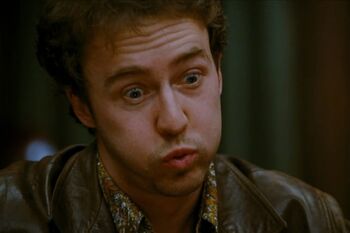(Editor's Note: Monday, September 11th marks the 25th anniversary of the release of the film Rounders. We decided to celebrate the anniversary by remembering fun facts related to the film and refreshing your memory of the text with poker analytics of the film.)
Data:
– In the first version of the script, in the famous “game against the champion” scene (its poker analysis is below), the main character was supposed to bluff Phil Hellmuth, not Johnny Chan.
– The scene in which Edward Norton’s character eats a hot dog on the street did not suit director John Dahl for a long time. Norton ended up eating 17 hot dogs.
– According to the script, Worm played by Norton should be a heavy smoker, but the actor flatly refused to smoke on camera; he is an opponent of this bad habit.
– Screenwriters David Levin and Brian Koppelman, with whom many attribute the success of the film, can be seen in the film – they appeared in the scene with the reading of amateurs’ tells in Atlantic City
– Levin and Koppelman have been friends and worked together all their lives; they met when they were 14 years old on a bus that was taking children to summer camp. Their main success was the show “Billions.” The main character’s girlfriend was to be played by actress Neve Campbell, who by that time had already become famous for her role in the horror film “Scream.” However, she refused, and the role went to Gretchen Mol.
– As part of the film's promotional campaign, Damon and Norton played in the main event of the 1998 World Series. Norton was eliminated with a full against quads, and Damon was eliminated by Doyle Brunson (KK vs. AA).
The original version of the article was written for PokerNews Russia magazine in 2008.
Many good and bad films have been made about poker. The film Rounders is the best. There is no doubt about it. The film, which stars Edward Norton, John Malkovich, John Turturro, and Matt Damon, only needs a competent script and a director without oddities to succeed. The Rounders are fine with this. It’s not for nothing that many older American players say that this movie brought them to poker, and not Moneymaker’s triumph in 2003...
Handsome Mike McDermott, played by Matt Damon, played poker well before entering law school. He mastered not only mathematics, but also the psychology of the process. However, his poker science course was incomplete. Mike took the pressure of playing to his bankroll lightly, and it cost him dearly. One day, after risking all his money, he lost it to bearded Russian mafia boss Teddy KGB (John Malkovich), a cunning and treacherous opponent.

Fortunately, the days of “Smoking Barrels” had not yet come, and at the exit of the club Mike was not waiting for Barry the Baptist, voicing the interest payment scheme, but for an older friend, Knish (the magnificent John Turturro), who said that he still considered Mike a winning player and was ready to stake him for half of the winnings. But the main character considered that the crime should be followed by punishment, refused the tempting offer, and (as you understand, temporarily) quit poker.
Mike held on for a while. He drove a truck for pennies, and tried to learn laws and precedents. But one fine evening he brought a folder with documents for Professor Petrovsky and discovered that the professor, along with other serious lawyers – judges, prosecutors, lawyers... – was playing stud. The student demonstrated his remarkable ability to “read” his opponents by calling everyone's hand and knocking them out of the pot with a bluff on sixth and seventh street, playing for Petrovsky. Soon the wise professor hinted to Mike that it would be a sin to bury such talents...

In addition, a complete gambler and childhood friend of the main character, nicknamed Worm (Edward Norton), was released from prison, and the hero himself quarreled with a girl over poker (this complex and important topic is revealed in the film with frightening authenticity). Moreover, in order to help out his scoundrel friend, Mike urgently needed money, but how to get it without playing?
There is a lot to think about and a lot to enjoy in this film. If you haven't seen it, be sure to check it out. If you have only seen it in Russian translation, consider that you have not seen it. Only a thorough Dmitry Puchkov would have mastered John Malkovich's parody Russian accent, Edward Norton's jokes, and poker terminology that is unusual for the outside ear. So watch the original DVD! Possible with subtitles.
The film mainly plays Stud and No Limit Hold'em. There are many fragments and entire hands shown, but we will focus on the confrontation between Mike and Teddy KGB, and also mention a hand involving the legendary Johnny Chan.
Bluffing against the champion
A rather uninteresting hand from a poker point of view, but important for the scenario. Finding himself in one of the Atlantic City casinos, our hero discovers world champion Johnny Chan at the poker table. He sits down with a short stack, does not take part in the game for a long time, and then enters into a principled duel. Chan raises preflop, Mike reraises with a weak hand, and then re-raises again. Chan looks into his opponent's eyes for a long time and throws his cards away.
Analysis
Children! Never play like the hero in the movie! That's bullshit. Especially considering that the game, judging by the description, was Limit Hold'em. By the way, it is completely incomprehensible what kind of hand Johnny Chan could throw away in such a confrontation, even if Mike had a very tight image... The actions of the main character can be regarded solely as an expensive test of the quality of his poker face. If the world champion didn’t read when I’m bluffing, why should I be afraid of some Teddy KGB!
Frustration
Teddy KGB underground gambling club. Mike, full of confidence after the incident in Atlantic City, decides to risk all his money and then go to Vegas – where the real game is...
Four people in the game. Blinds seem to be $50-$100. Mike on the button, Teddy KGB in the big blind. The player in first position folds. Mike has , and he raises to $500. The small blind folds. The incredulous bearded Russian notes: “Positional raise – I call.”
Flop: . Teddy checks, and Mike makes a big bet – $2000. His opponent slowly eats the cookie and calls.
Turn: . Teddy checks again. Mike – check.
River: . The Russian wakes up and bets $15,000. Mike thinks for a long time, and then, with the words “I don’t think you have spades,” he moves all his remaining chips to the center – $33,000 (everyone started with stacks of $25,000).
“You're right, I don't have spades,” Teddy KGB replies, calls, and opens . Mike McDermott, who realized everything as soon as Teddy spoke, goes bankrupt.
Analysis
The game at a short table follows its own laws. The background of the relationship often becomes no less important than the cards themselves. This hand, taken out of context, raises many questions.
Preflop was played quite normally (except that the size of the preflop raise was completely off): McDermott bets with a good suited ace, and Teddy KGB calls with a pair of aces. The standard play is, of course, a reraise, but Teddy disguises the strength of his hand in hopes of luring his opponent into a trap. This is a risky tactic, but in this case, it completely paid off.
After the flop, Mike plays against a specific opponent. He has two top pair and makes a big overbet, believing that Teddy will interpret it as an attempt to steal the pot and can reraise with no hand. Teddy, in turn, only calls with a set of aces, without defending against either a straight draw or a flush draw. A decent reraise would have looked more appropriate here, and it is unlikely that Mike, in captivity of his own delusions, would have found the strength to fold two pairs.
Anyway, after Teddy called on the flop, Mike decided that his opponent had a flush draw. The turn gave both a full house, check-check. The third spade came on the river, and Teddy KGB, with the best possible hand, made a huge bet of three pots. There was no longer a choice here. You need to have developed psychic abilities to put Teddy on a pocket pair of aces, taking into account his actions preflop and the flop. And we beat any other full houses and flushes... In general, the hero of John Malkovich played riskily, but in the end, he ended up with a big win. It also happens.
Cowboys
The second meeting between Teddy KGB and Mike McDermott took place in a warm and friendly atmosphere. If he failed, Mike, entangled in his own and other people's debts, risked not living until the evening of the next day. The game was controlled by Teddy's KGB thugs. They agreed to play no-limit Texas Hold'em again with blinds of $25-$50. Mike had only $10,000, loaned by the compassionate Professor Petrovsky.
In the first hand, Mike receives and makes a giant raise – $1,000. “Very aggressive,” Teddy commented, “but I’m raising. $5,000." After some thought, Mike moved all the chips to the center of the table – all in. His opponent was a bandit, but clearly not a petty sharper, so he didn’t have aces, and he folded his cards.
There is practically nothing to analyze here – all the actions are quite standard, except for the size of the bets. To be honest, the performance of the hero John Malkovich does not make a strong impression.
Luck on the turn
Having won half of his opponent's chips in the first hand, Mike took the first match to victory without much trouble. Here is the last hand of the match.
On the turn Mike bets $1,000 and Teddy calls. River , Teddy checks, Mike bets $2,500, which is all Teddy has left. Should call. “A pair of jacks,” says Mike, presenting . “They're good,” Teddy replies in a dull voice and throws away his cards. “You're lucky, you caught a jack on the turn. It was just luck". Mike doesn't argue.
Excuse me, why was it lucky? J-10 suited is a favorite against a random hand preflop. On the flop Mike had a flush draw and two overcards – almost even odds against, say, a pair of nines. The feeling that Teddy KGB doesn't really understand poker is growing stronger. And he is too nervous for an experienced player.
Apparently sensing his advantage, Mike takes Teddy’s bait and agrees to continue the match.
This is how the cookies crumble
However, things went well for Teddy in the second fight. The bets have increased – the opponents at the table have $20,000, the blinds are $50-$100. The wily Russian won most of Mike's chips and had to end the game in the next hand.
We see the flop . “Don’t be afraid, son, it will all be over soon,” Malkovich says in his incomparable “Russian” accent, crunching on cookies. Mike takes up the chips, intending to bet, but suddenly changes his mind and says “check”. “No checks,” Teddy shakes his finger and bets himself. Mike open folds .
– "You've got , and I'm not drawing against a made hand,” he explains to his shocked opponent. He realizes that he was “read” by the cookie, and in anger throws the box against the wall. "Not hungry?" – Mike is interested. Game continues.
There is nothing to analyze again. It is clear that top two pair in heads-up are a real monster. But if you don't trust your poker instincts, why play? Based on his opponent's behavior, Mike read his hand and folded two pair without much regret.
What was Teddy's KGB?
And now it’s time for the film’s main giveaway. There is still a sluggish debate surrounding it: what cards did the villain John Malkovich have? Even professional poker players were not left out. What is typical is that they could not come to a common opinion.
Mike is already ahead of Teddy in terms of stack size. With he makes a min-raise after the limp, Teddy calls.
Flop gives Mike the absolute strongest hand possible and is completely safe. Mike checks, and the aggressive Russian bets $2,000. “Call, let’s take a chance,” Mike says with a sigh, showing with all his appearance that he doesn’t have a made hand.
“Are you on a draw?” – Teddy inquires. The turn is . Mike checks again, and Teddy bets the pot, $4,400. Mike dejectedly calls again. The comes on the river. And our hero, remembering the decisive hand of the 1988 World Series between Johnny Chan and Erik Seidel, says “check” in a depressed voice.
“Ace couldn’t help you,” Teddy says and throws the remaining chips on the table. All-in.
– You're right, the ace didn't help me. “I flopped the nut straight,” Mike replies and flips his cards over. He won. Now you can pay off your debts and go to Vegas.
Analysis
Mike McDermott's performance is not discussed in this hand. He caught the strongest hand possible and won his opponent's entire stack. The board remained as safe as possible, the opponent remained aggressive, and victory came by itself. The only interesting point is the check on the river. With this decision, Mike provokes his opponent to bluff. The ace coming down is a little confusing: after all, a weaker pair, seeing the ace, could very well check back, just in case. The ace clearly confused Teddy, but then he decided that the ace was not helping McDermott and continued his aggression.
What did Teddy have? The filmmakers do not answer this question. There are two main versions. According to the first, he again has a very strong hand – a pocket pair of aces or tens. He doesn't raise preflop, luring his opponent into a trap, then bets aggressively on the flop and turn, is defiantly embarrassed at the sight of an ace, but then overcomes his “fear” and continues to attack. According to the second version, he... has nothing! Some professionals, for example, Chris Ferguson, think so. The logic here is this: if you think your opponent has a missed straight draw, why go all-in on the river? Just to knock him out of the pot and not show his bluff...
In general, everything ended well. Mike McDermott repaid the debt to Professor Petrovsky and flew to Vegas, and Teddy KGB returned to the TV in the next room. Judging by the sadness in his eyes, he understood that only a few years would pass, and with the development of online poker, the underground poker club would lose all its clients...
Although, maybe he was just sorry for the lost money.
PS According to the IMDB database, the ROI (return on investment) of the creators of this film is 170%. A movie about poker can be no less profitable than poker itself. As long as it's a good movie...











